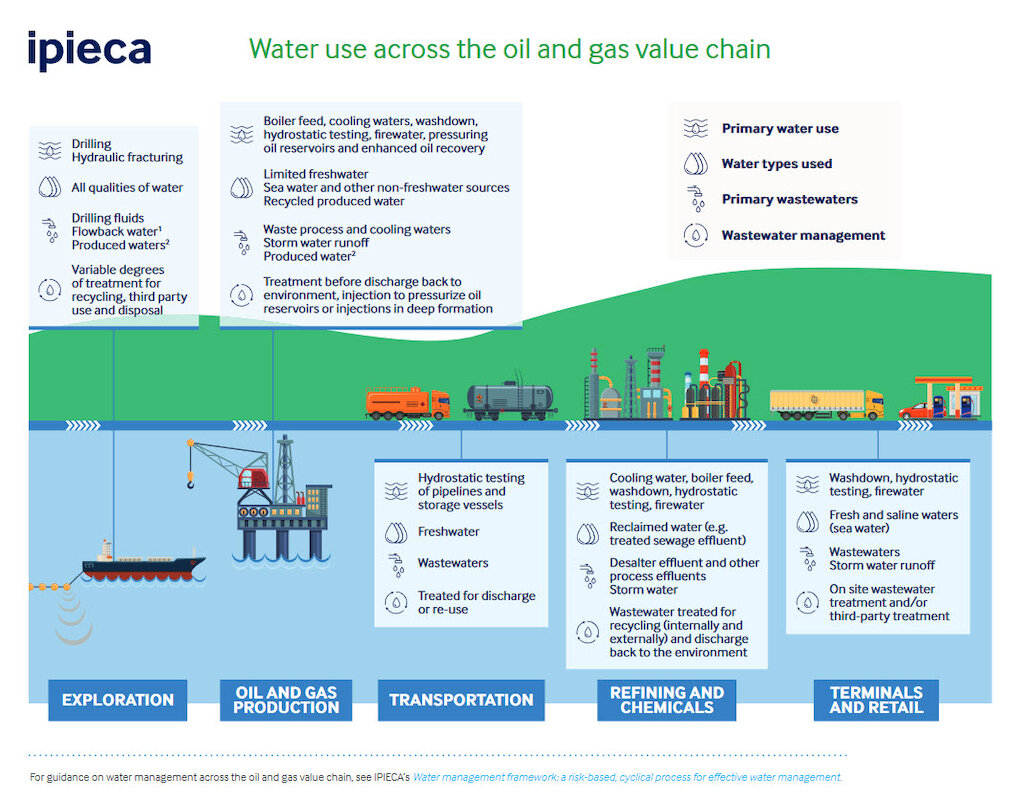Water quality and quantity is of global environmental concern and this both presents risks and opportunities for the industry. Water is used throughout the project life cycle of oil and gas activities and is core to business continuity. Through a combination of practical tools, good practices and a forum for sharing industry knowledge, Ipieca enables the oil and gas industry to proactively identify potential water risks and to manage water issues.
There is growing pressure on water resources in many parts of the world due to both local and global factors.
Water management principles
Ipieca has outlined some key guiding principles relevant for water management across the life cycle of oil and gas operations. These principles are embedded in the good practices guidance documents that are developed.
- Water stewardship
Water stewardship is one of the key principles that underpin good practice in water management. It conveys the idea of going beyond simply managing risks and impacts from water use. Water Stewardship is the use of water that is socially equitable, environmentally sustainable and economically beneficial, achieved through a stakeholder-inclusive process (Alliance for Water Stewardship [AWS], 2014). Four aspects (derived from AWS, 2014) capture the intent of water stewardship:
- Water governance;
- Sustainable water balance;
- Water quality; and
- Important water-related areas.
- Integrated Water Resource Management
Through a combination of practical tools, good practices and a forum for sharing industry knowledge, Ipieca helps the energy industry to proactively identify potential water risks and collectively manage water issues.
Ipieca’s activities to promote responsible water stewardship include:
- working to increase awareness of global and local water risk;
- developing good practice for water management along the project life cycle;
- promoting greater consistency in water reporting; and
- providing a platform to communicate the oil and gas industry’s achievements, goals and progress.
- Stakeholder engagement
In all except the most remote locations, human activity will already be using, and dependent on, local water resources to some extent. Recognition of these stakeholders together with cultural values that may be assigned to water and involving them in the development process can be crucial to project success. Inclusivity is a key principle underlying stakeholder engagement. Where appropriate, stakeholders that may be affected by the project should be identified and engaged with as early as possible.
- Risk assessment
There will always be risks associated with water use on a project, be they financial, environmental or social. These should be identified during the early stages of the project and assessed on an ongoing basis bearing in mind that as a project evolves, so its associated risks may change.
- Continuous improvement
Management of water should involve a continuous cyclical process of improvement throughout the life of oil and gas operations. Typically, a greater level of detail is provided during each of the planning and design phases until water source selection is complete.
Water risk assessment
Identifying and assessing water risks throughout the life cycle of oil and gas activities is an essential component of a company’s water strategy, particularly as projects can last decades. Ipieca has developed tools to aid in this process.
Local Water Tool (LWT)
The GEMI LWT™ for Oil and Gas helps to evaluate the high-risk locations and identify actions to manage the risks. An option is provided in the GEMI tools to enable the user to transfer specific site data from the WBCSD or Ipieca tool. The GEMI LWT can enable companies to map their water use and assess risks by identifying and prioritising high-risk sites and also help identify the external impacts, business risks, and opportunities related to water use and discharge at specific sites or operation
E-learning training course
Ipieca’s e-learning course (French) (Spanish) guides oil and gas professionals through the tools - how they work and how to apply them to business.
Once water risks have been identified they need to be managed. Throughout the life cycle of oil and gas activities water is used and produced, Ipieca recognises the importance of managing water effectively and maintaining business continuity as well as license to operate.
Ipieca has developed a set of good practice guidance documents to promote responsible and effective water management throughout the life cycle of oil and gas activities and continues to build on the set of guiding principles. This includes guidance on water sourcing as well as water efficiency and use.
Good practice for water management
Ipieca has developed a set of good practice guidance documents to promote responsible and effective water management.
Water sourcing: The Ipieca Guide to identifying and assessing water sources presents a systematic process for the onshore industry to select water sources that best meet project needs within the broader context of local or regional water management. The guide is applicable to both new projects and existing operations and uses case studies to provide practical examples of the process stages outlined.
Water use and efficiencies: Ipieca's Efficiency in water use: guidance document for the upstream onshore oil and gas industry presents a systematic process for the onshore oil and gas industry to identify and assess potential measures to improve water efficiency via incorporating the principles of water stewardship, integrating water resource management and risk assessment throughout the life of an operation. This guidance is applicable to both new and existing operations and uses case studies to provide practical examples.
Produced water management: The industry handles large volumes of produced water that are separated at different stages during hydrocarbon extraction and processing. Produced water typically contains high quantities of salt, in addition to other minerals, metals and organic compounds (in both aqueous and non-aqueous phases). In many circumstances produced water can be reused and this can be seen as an opportunity for the industry. If this is not possible, it usually requires treatment to comply with environmental requirements prior to disposal or discharge to the environment. Ipieca has developed a fact sheet on evaluating the opportunities and challenges of reusing produced water for the onshore oil and gas industry.
Waste water management: Oil and gas water treatment systems produce by-products that include large volumes of brine, salt, hydrocarbon and wastewater sludges and other concentrated contaminants in waste streams, both in liquid and solid waste forms. These need to be responsibly managed, handled and treated. In 2021 Ipieca published the Water management framework, a risk-based, continuous improvement process to water management, which can be applied across any local hydrological, environmental, social-economic and regulatory setting. It facilitates an integrated approach to water resources management and can also be used as a communication tool with external stakeholders on how the industry is managing and protecting water resources. The framework takes a holistic view across the value chain and promotes a collaborative approach to identify and understand potential impacts on ecosystem services and the needs of other users.






